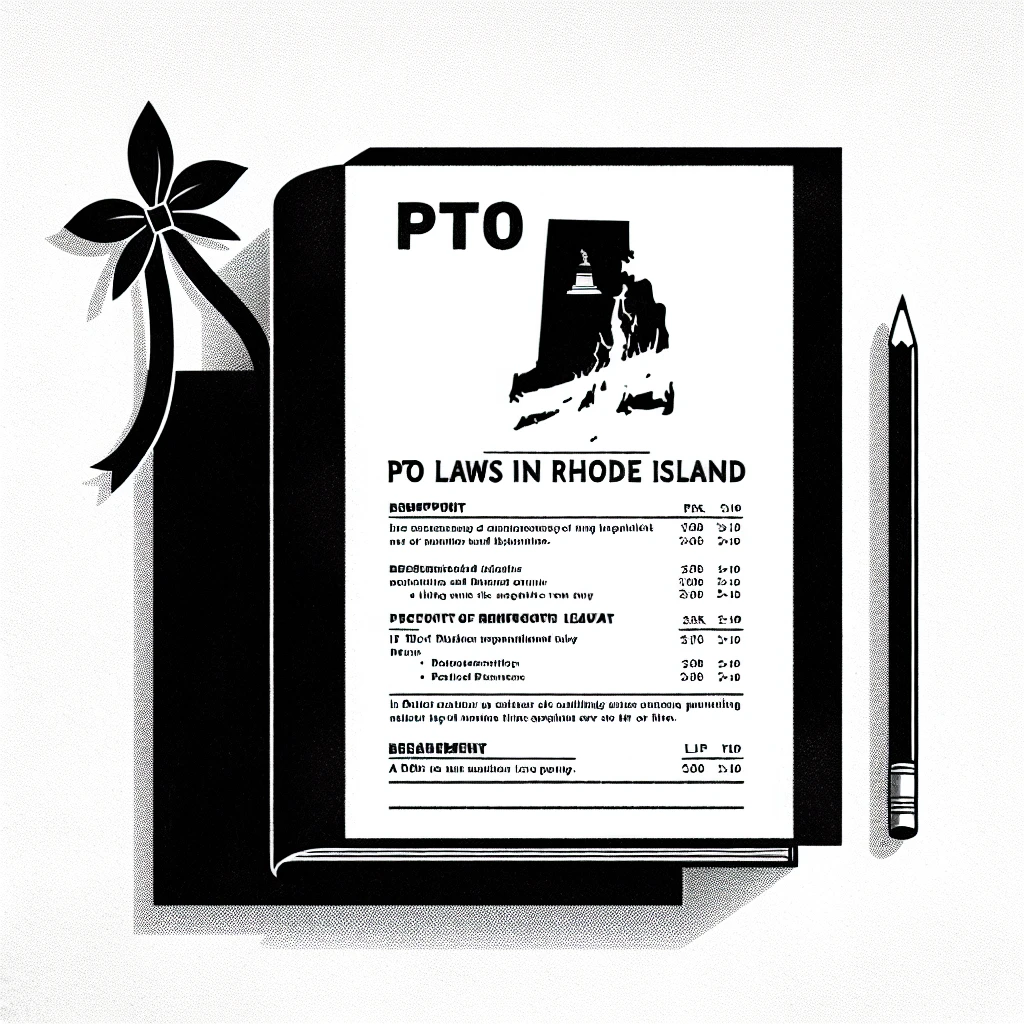Rhode Island Pto Laws: What You Need To Know
Short Answer for “rhode island pto laws”
Yes, Rhode Island has specific laws governing paid time off for employees, including vacation and sick leave.
Rhode Island PTO laws refer to the regulations governing paid time off for employees in Rhode Island.
Explanation of PTO PTO stands for paid time off, which includes sick leave, vacation time, and other paid leaves provided by employers.
Importance of Understanding Rhode Island PTO Laws It is important to understand Rhode Island PTO laws to ensure that employees receive the benefits they are entitled to and to ensure compliance with state regulations.
Key Takeaways on Rhode Island PTO Laws
-
Understanding Rhode Island PTO laws is crucial for employees to receive entitled benefits and for employers to comply with regulations.
-
Eligibility and accrual of vacation leave are important aspects of employment in Rhode Island, with specific rules for accrual rates and usage.
-
Employers have obligations to accurately track and record vacation leave accrual and usage, as well as communicate the vacation leave policy to employees.
-
Employees in Rhode Island have specific rights related to vacation leave, and are entitled to receive a payout for any unused vacation leave hours upon termination.
-
Rhode Island has specific requirements for paid and unpaid sick leave, and employers are responsible for providing a minimum of 40 hours of paid sick leave annually from January 1, 2024.

Vacation Leave
Eligibility and Accrual of Vacation Leave
In Rhode Island, the rules for accrual and eligibility of vacation leave are a crucial aspect of employment. According to Rhode Island PTO laws, employees become eligible for vacation leave based on the duration of their service with the employer. Typically, employees accrue vacation leave hours based on the length of their employment, with a standard accrual rate of x hours per month. Some companies also implement a tiered system, where employees earn a higher number of vacation hours for each additional year of service. It’s important for employees to be aware of their specific eligibility criteria and accrual rates to ensure they receive the benefits they are entitled to under the law.
Employer Responsibilities for Vacation Leave
Employers in Rhode Island are responsible for ensuring compliance with PTO laws related to vacation leave. This includes accurately tracking and recording vacation leave accrual and usage for each employee. Employers must clearly communicate the vacation leave policy to their employees, including details on accrual rates, usage procedures, and any limitations or blackout periods. Additionally, employers are required to provide employees with a way to request and schedule vacation leave in accordance with state regulations. It’s the employer’s responsibility to facilitate a transparent and fair process for employees to utilize their accrued vacation leave as per the Rhode Island PTO laws.
Employee Rights for Vacation Leave
Employees in Rhode Island have specific rights when it comes to vacation leave, as outlined in the state’s PTO laws. Upon meeting the eligibility criteria, employees have the right to utilize their accrued vacation leave for rest, relaxation, and personal time off. They should also be aware of the process for requesting vacation leave, including the advance notice required and any company-specific guidelines. If an employer fails to honor an employee’s legitimate request for vacation leave, it can lead to a violation of the employee’s rights under the law. Therefore, it’s vital for employees to be familiar with their rights related to vacation leave and advocate for fair treatment in accordance with Rhode Island PTO laws.
Payout of Vacation Leave Upon Termination
Rhode Island has regulations in place regarding the payout of accrued vacation leave upon termination of employment. In accordance with state PTO laws, if an employee leaves their job or is terminated, they may be entitled to receive a lump-sum payment for any unused vacation leave hours they have accrued. This payment should be made promptly and in compliance with state labor regulations. It’s crucial for both employers and employees to understand the requirements for vacation leave payout upon termination to ensure a fair and lawful process under Rhode Island PTO laws.

Sick Leave
Paid and Unpaid Sick Leave Requirements
In Rhode Island, there are specific requirements for paid and unpaid sick leave. Starting on January 1, 2024, employers must provide a minimum of 40 hours or five days of paid sick leave annually. Before this date, employers could limit an employee’s use to 24 hours or three days during a year. It’s important to note that there are currently no federal legal requirements for paid sick leave in Rhode Island, emphasizing the significance of state-specific laws in this area.
Accrual and Usage of Sick Leave
The accrual and usage of sick leave in Rhode Island have substantial implications. Employees in Rhode Island are entitled to accrue sick leave from the first day of employment, earning at least one hour of paid leave for every 30 hours worked. Employers have the prerogative to limit or cap the overall amount of sick leave an employee may accrue, typically to 10 days or 80 hours. This underscores the importance of understanding the dynamics of sick leave accrual and usage within the state’s legal framework.
Employer Obligations for Sick Leave
Employers in Rhode Island have specific obligations concerning sick leave. They are mandated to provide at least 40 hours or five days of paid sick leave per year, with the full amount of this leave available for the employee’s use from the commencement of each year of employment, the calendar year, or a 12-month period. It is essential for employers to comprehend and adhere to these obligations to ensure compliance with state laws and safeguard the rights of their employees.
Protections for Employees Taking Sick Leave
Employees in Rhode Island are protected when taking sick leave. The state’s laws prioritize the well-being of employees, ensuring they have the necessary provisions and protections when availing sick leave. This includes safeguarding employees’ rights when they need to utilize their entitled sick leave for eligible reasons, such as medical situations for themselves or their immediate family. This emphasizes the significance of upholding and respecting employees’ rights when it comes to sick leave, fostering a supportive and inclusive work environment.

Bereavement Leave
Definition of Bereavement Leave
Bereavement leave, also known as grief leave, is a type of paid or unpaid leave given to employees to allow them to grieve for the loss of a loved one and attend to immediate post-death matters such as funeral preparations and estate arrangements. It is a compassionate policy designed to provide emotional support and flexibility during a challenging time.
Eligibility and Usage of Bereavement Leave
The eligibility for bereavement leave in the state of Rhode Island falls under the jurisdiction of PTO (Paid Time Off) laws. In most cases, eligible employees can utilize bereavement leave upon the death of an immediate family member, such as a spouse, child, parent, or sibling. The usage of bereavement leave varies among organizations, with some offering a specific number of days off for bereavement, while others may have a more flexible approach depending on the circumstances.
Employer Responsibilities for Bereavement Leave
Employers in Rhode Island are responsible for ensuring that their bereavement leave policies comply with state laws and regulations. This includes clearly defining the terms and conditions of bereavement leave, providing information on eligibility criteria, and offering support and understanding to employees during their time of need. Communication is key in these situations, and employers should maintain open channels to discuss bereavement leave arrangements with their employees.
Potential Extensions for Bereavement Leave
In some cases, employees may require additional time off beyond the standard bereavement leave period. This can be due to various factors such as travel for funeral arrangements, legal matters, or the emotional toll of the loss. Employers may consider offering extension options for bereavement leave to accommodate these circumstances, either through additional paid leave or flexible work arrangements. These extensions can provide the necessary support for employees to manage their responsibilities while coping with their loss.
Conclusion
Rhode Island PTO laws play a vital role in ensuring that employees receive the benefits they are entitled to and that employers comply with state regulations. Understanding the eligibility criteria, accrual rates, and employer responsibilities for vacation leave is essential for both employees and employers to uphold the law and facilitate a fair and transparent process.
Additionally, the regulations for paid and unpaid sick leave, as well as bereavement leave, emphasize the importance of state-specific laws in providing necessary provisions and protections for employees during difficult times. Adherence to Rhode Island PTO laws is crucial for fostering a supportive and inclusive work environment while safeguarding the rights of both employees and employers.
